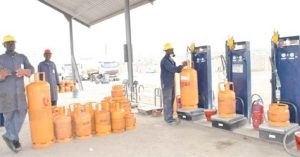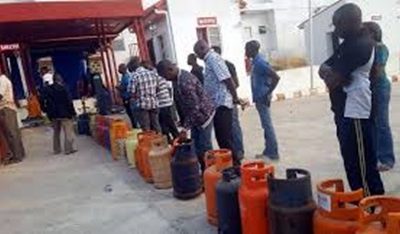Business
See Cooking Gas Price, As Scarcity Hits Major Cities

The scarcity of cooking gas in major Nigerian cities has caused price increases and shortages, with a kilogram now selling between N1,800 and N3,500 across parts of Lagos and Ogun states.
Price increases were also recorded in other parts of the country, including Port Harcourt, Cross River, Kano, and Kaduna States
Recall that the Petroleum and Natural Gas Senior Staff Association of Nigeria (PENGASSAN) had embarked on a nationwide strike last week to protest staff retrenchments at Dangote Refinery.
Although the strike has been suspended, gas retailers reported that the disruption in supply has led to rationing, stock depletion at many outlets, and soaring prices, ranging from N1,000 to as high as N1,800 per kilogram in affected areas.
Checks reveal that in Abuja, the cost of refilling a 12.5kg cooking gas cylinder soared from N13,000 to a range of N17,000 to N18,750 depending on the location.
Key commercial districts such as Wuse, Garki, and Kubwa report higher prices, with 1kg of liquefied petroleum gas (LPG) retailing between N1,350 and N1,500. Some outlets in Jabi, pricing 12.5kg cylinders around N17,000,
It was gathered that most retailers did not have the product as of Sunday morning, while those with stock also increased their prices.
Gas scarcity across Lagos and Ogun State metropolises has affected pricing, as Ikg of gas soared over the weekend.
As of last week, 1 kg of gas cost N1,000 in Lagos State and N1,100 in Ogun State gas stations.
However, as of Friday, the price had soared to N1,300 and went up to N1,400 on Saturday.
Those who bought gas on Sunday said a Kg went for N1,500 at gas stations, while retailers sold at between N1,600 and N1,800 per kg.
Meanwhile, the President of the Nigerian Association of Liquefied Petroleum Gas Marketers (NALPGAM), Olatunbosun Oladapo, attributed the scarcity and sharp rise in cost to a temporary supply distortion triggered by the PENGASSAN strike and internal maintenance at the Dangote Refinery.
He said that while the strike disrupted vessel berthing at Lagos terminals, the NLNG had supplied Port Harcourt in large volumes, which explains why the South-South region did not experience the same level of scarcity.
Oladapo added that normalcy is expected to return within days as Dangote and other suppliers would soon resume full-scale loading.
The NALPGAM President said, “At the moment, I can tell you authoritatively that most of our LPG supply is produced locally.
Importation is minimal. In fact, if you import now, you might incur losses because local supply has increased significantly.”
Also, energy law expert and Partner at Bloomfield LP, Dr Ayodele Oni, lamented that despite improved upstream gas and NGL production, Nigeria continues to experience periodic domestic shortages and sharp price increases.
According to him, higher production does not automatically translate into greater domestic bottled-LPG availability, as much of the locally produced LPG is still exported.
He noted that while domestic gas sales rose by about 22 per cent year-on-year to roughly 65,632 metric tonnes in March 2025, a significant share of LPG is monetised through exports instead of being channelled into local bottling and retail.













